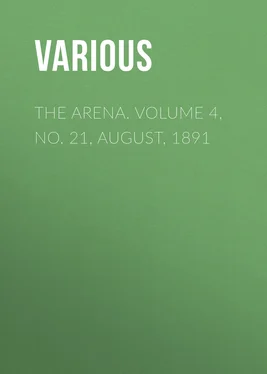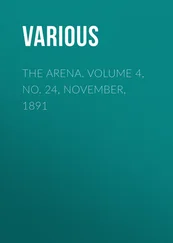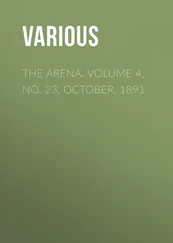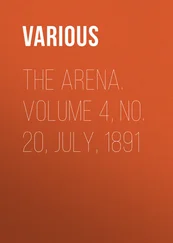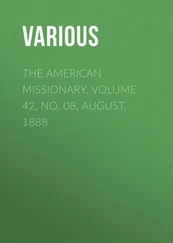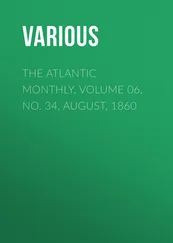Various - The Arena. Volume 4, No. 21, August, 1891
Здесь есть возможность читать онлайн «Various - The Arena. Volume 4, No. 21, August, 1891» — ознакомительный отрывок электронной книги совершенно бесплатно, а после прочтения отрывка купить полную версию. В некоторых случаях можно слушать аудио, скачать через торрент в формате fb2 и присутствует краткое содержание. Жанр: foreign_antique, periodic, foreign_edu, на английском языке. Описание произведения, (предисловие) а так же отзывы посетителей доступны на портале библиотеки ЛибКат.
- Название:The Arena. Volume 4, No. 21, August, 1891
- Автор:
- Жанр:
- Год:неизвестен
- ISBN:нет данных
- Рейтинг книги:4 / 5. Голосов: 1
-
Избранное:Добавить в избранное
- Отзывы:
-
Ваша оценка:
- 80
- 1
- 2
- 3
- 4
- 5
The Arena. Volume 4, No. 21, August, 1891: краткое содержание, описание и аннотация
Предлагаем к чтению аннотацию, описание, краткое содержание или предисловие (зависит от того, что написал сам автор книги «The Arena. Volume 4, No. 21, August, 1891»). Если вы не нашли необходимую информацию о книге — напишите в комментариях, мы постараемся отыскать её.
The Arena. Volume 4, No. 21, August, 1891 — читать онлайн ознакомительный отрывок
Ниже представлен текст книги, разбитый по страницам. Система сохранения места последней прочитанной страницы, позволяет с удобством читать онлайн бесплатно книгу «The Arena. Volume 4, No. 21, August, 1891», без необходимости каждый раз заново искать на чём Вы остановились. Поставьте закладку, и сможете в любой момент перейти на страницу, на которой закончили чтение.
Интервал:
Закладка:
That, indeed, brought the Hohenzollerns on the scene, and lent to prosaic history its legend, giving to Frederick’s “big battalions” the white-robed heroine who should lead them on.
Whether, through the long years of indecision, during which disorder and revolution seemed the danger to be averted, the future “Chancellor of Iron” matured his plans after the manner of Newton, by “forever thinking of them” is still a question to be adequately answered by himself alone. This much is certain that when, in 1863-64, the subject of the Duchies cast its shadow on the path, it revealed its importance to Bismarck, as it had done fourteen years previously to Dahlmann, and stood forth distinctly as the initial syllable of the one mystical word, Unity .
Schleswig-Holstein was, as a matter of fact, and by all its several complications, the German question; it was its sign and portent, and if action of some sort were not taken thereupon, the door set ajar was closed upon the future, for a generation at least. Palmerston’s declaration, than which no unwiser one was ever made, touching the insanity of the man who should seek to understand the enigma of the Danish Duchies, was adopted in England solely from the dense and inconceivable ignorance of the British mind on all German topics, and the equally inexplicable but inborn dislike of all British politicians to grapple with any serious study of them.
It was the problem to which no German of the North could show indifference; and it was the one subject which brought Prussia to the fore, and put her reigning house in the van, forcing the Hohenzollerns into predominance. This was a crucial point, and wondrous to record! the will of Bismarck on that exceedingly curious detail brought the Hapsburgs together with the Hohenzollerns; Frederick with Marie-Therèse, Wallenstein’s camp with Rebels, in an unescapable atmosphere of rank Germanism!
But here again the first step of the forthcoming ruler was taken in obedience to an irresistible, though, perhaps, unavowed, national suggestion. The sense of all that the past had given to German history, to the power of German thought, formed a part of Bismarck’s very nature, and spite of the timidity of his experienced statecraft, he could not disobey the promptings of the German conscience.
When the quick-witted French public applied to Professor Lévy Brühl’s work the title of “The idea whence comes the fact,” they awarded it its permanent signification; it is the development of the German conscience that causes the imperial unity of Germany, and no one is more thoroughly aware of that than the famous chancellor.
We feel with whomsoever was a witness of the crowning struggle, that nothing can even paint its gigantic character more aptly than the concluding phrase of the now famous French historian:—
… “Thus was formed the virtual German nation,—the nation that willed to be, and for long years could not be because reality refused to bear out practically all its ideals. It was in truth, l’ame qui cherche un corps !”
These words can never be improved upon. The chancellor knows their truth, as the Kronprinz knew it, but the years lying between them threw a certainty of glory into one which the other could not attain to,—and Bismarck, too, was a man of old Prussia, of her ancient traditions and formalities, while the crown prince was modern amongst moderns—a soldier, yes! but pre-eminently a man, a citizen; but though each felt his conviction differently, its strength was one and the same in both.
The unity of Germany was the creation of no individual. German unity and the imperial unity sprang from the whole past of German history and German thought. The State existing now is the outcome of Germany’s own self, of the idea, of the soul of Germany.
“SHOULD THE NATION OWN THE RAILWAYS?” 9 9 The first part of this admirable essay appeared in July Arena.
PART II.—The Advantages of National Ownership
First would be the stability and practical uniformity of rates now impossible, as they are subject to change by hundreds of officials, and are often made for the purpose of enriching such officials. State and federal laws have had the effect of making discriminations less public and less numerous, but it is doubtful if they are less effective in enriching officials and their partners, although it may be necessary to be more careful in covering tracks. That they are continued is within the cognizance of every well-informed shipper, and are made clear by such cases as that of Counselman and Peasley, now before the United States Supreme Court. Counselman and Peasley—one a large shipper and the other a prominent railway official—refused to testify before a United States grand jury upon the plea that to do so might criminate themselves; the federal law making it a criminal offence to make or benefit by discriminating rates. Counselman had been given rates on corn, some five cents less per hundred pounds than others, from Kansas and Nebraska points to Chicago.
The outrageous character of this discrimination will appear when we reflect that five cents per one hundred pounds is an enormous profit on corn that the grower has sold at from eighteen to twenty-two cents per one hundred pounds, and that such a margin would tend to drive every one but the railway officials and their secret partners out of the trade, as has practically been the case on many western roads. Doubtless such rates are sometimes made in order to take the commodity over a certain line, and there is no divide with the officials; but the effect upon the competitors of the favored shipper and the public is none the less injurious, and such practices would not obtain under national ownership, when railway users would be treated with honesty and impartiality, which the experience of half a century shows to be impossible with corporate ownership.
Referring to the rate question in their last report, the Interstate Commerce Commission says: “If we go no farther than the railroad managers themselves for information, we shall not find that it is claimed that railroad service, as a whole, is conducted without unjust discriminations.”
“If rates are secretly cut, or if rebates are given to large shippers, the fact of itself shows the rates which are charged to the general public are unreasonable, for they are necessarily made higher than they ought to be in order to provide for the cut or to pay the rebate.”
“If the carrier habitually carries a great number of people free, its regular rates are made the higher to cover the cost; if heavy commissions are paid for obtaining business, the rates are made the higher that the net revenues may not suffer in consequence; if scalpers are directly or indirectly supported by the railroad companies, the general public refunds to the companies what the support costs.”
The Commission quotes a Chicago railway manager as saying: “Rates are absolutely demoralized and neither shippers, passengers, railways, or the public in general make anything by this state of affairs. Take passenger rates for instance; they are very low; but who benefits by the reduction? No one but the scalpers…. In freight matters the case is just the same. Certain shippers are allowed heavy rebates, while others are made to pay full rates…. The management is dishonest on all sides, and there is not a road in the country that can be accused of living up to the interstate law. Of course when some poor devil comes along and wants a pass to save him from starvation, he has several clauses of the interstate act read to him; but when a rich shipper wants a pass, why he gets it at once.”
From years of ineffectual efforts on the part of State and national legislatures and commissions to regulate the rate business, it would appear that the only remedy is national ownership, which would place the rate-making power in one body with no inducement to act otherwise than fairly and impartially, and this would simplify the whole business and relegate an army of traffic managers, general freight agents, soliciting agents, brokers, scalpers, and hordes of traffic association officials to more useful callings while relieving the honest user of the railway of intolerable burthens.
Читать дальшеИнтервал:
Закладка:
Похожие книги на «The Arena. Volume 4, No. 21, August, 1891»
Представляем Вашему вниманию похожие книги на «The Arena. Volume 4, No. 21, August, 1891» списком для выбора. Мы отобрали схожую по названию и смыслу литературу в надежде предоставить читателям больше вариантов отыскать новые, интересные, ещё непрочитанные произведения.
Обсуждение, отзывы о книге «The Arena. Volume 4, No. 21, August, 1891» и просто собственные мнения читателей. Оставьте ваши комментарии, напишите, что Вы думаете о произведении, его смысле или главных героях. Укажите что конкретно понравилось, а что нет, и почему Вы так считаете.
